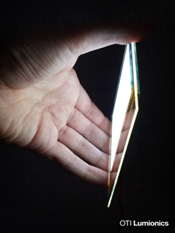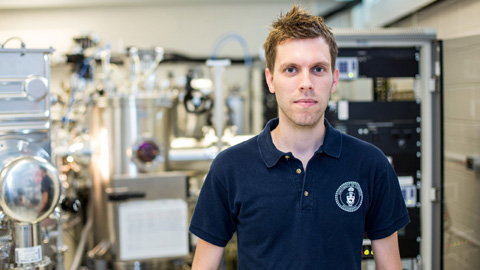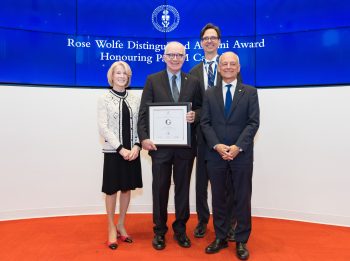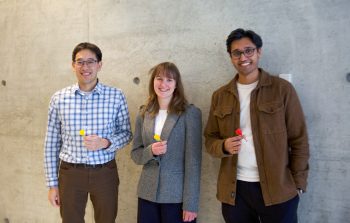With the latest LED technology, tomorrow’s televisions and smartphones are set to be thinner and more flexible than ever. And now, thanks to a startup from U of T Engineering alumni, they could be more affordable as well.
OTI Lumionics is one of 11 startups – two of which hail from Engineering – that recently completed U of T’s elite accelerator program, Creative Destruction Lab, based at the Rotman School of Management.
The fledgling enterprises spent the last eight months developing various technical and business aspects of their companies, while meeting with Canadian business and entrepreneurship titans. The Lab focuses on preparing ventures for success, as well as connecting them to early-stage investors.
With two cohorts graduating from the program so far, the Lab claims that graduated ventures have already collectively generated approximately $130 million in equity value (value of a company to owners or shareholders).
“We are excited to see how much the second cohort of ventures has grown since they first applied back in September 2013,” said Jesse Rodgers, director of the Lab. “We had an increase in both the overall quality and quantity of applications this year, and it was really great to see eleven ventures successfully complete the program.”
Learn more about two of this year’s Engineering-related startups:
 OTI Lumionics
OTI Lumionics
Forget your clunky television, tablet or smartphone. With organic light-emitting diodes (OLEDs), digitals displays can be as thin and flexible as a sheet of paper.
U of T Engineering alumni startup OTI Lumionics is working on unlocking the full potential of OLEDs through innovative equipment, materials and processes.
OTI president Michael G. Helander (EngSci 0T7, MSE PhD 1T2), development vice-president Xiaofeng Terry Xu (MASc MSE 1T12) and their team are reducing the cost of OLED technology. This could open up new possibilities for use across a wide array of industries, including lighting, displays, solar cells and more.
“Our patented solutions eliminate the bottleneck in traditional OLED manufacturing, enabling low-cost and high-volume mass production,” reads the company’s website.
 Whirlscape
Whirlscape
You wouldn’t want a keyboard blocking half your desktop screen – so why do we put it with it for our smartphones and tablets?
Minuum, developed by the startup Whirlscape, is a tiny intelligent keyboard that takes up a fraction of the space on portable electronics. Predicting text with high accuracy, the single-line keyboard blasted beyond its Indiegogo crowdfunding campaign by 873 per cent.
Two of the company’s three co-founders come from U of T Engineering: Xavier Snelgrove (EngSci 1T1) and William Walmsley (MASc MIE 1T2).
“It’s really about the user’s expectations of the keyboard,” Walmsleytold online magazine The Verge. “Most of the frustration that happens when you’re using an iPhone keyboard is because you’re shown these distinct buttons, and you feel like you’re supposed to use it like a typewriter where you need to hit every button every time.
“But that’s completely unrealistic, because when you’re using a phone that’s that small, you’re going to be making mistakes all the time anyway. So by making the keys even smaller, really we’ve changed the user’s mindset to be aware that they’re supposed to miss every time… it’s the understanding that the system is always working with them to correct their spelling.”
[youtube https://www.youtube.com/watch?v=niV2KCkKmRw]
Read more about this Creative Destruction Lab cohort’s 11 startups.
About the Creative Destruction Lab
Founded in 2012 by ProfessorAjay Agrawal, the Creative Destruction Lab at the Rotman School of Management leverages leading faculty and industry networks, inventions, and talent from world-class, technology-oriented faculties at the University of Toronto as well as its location in Toronto, one of the world’s most culturally diverse cities and Canada’s largest financial centre.
The Rotman School of Management at the University of Toronto is redesigning business education for the 21st century with a curriculum based on Integrative Thinking. Located in the world’s most diverse city, the Rotman School fosters a new way to think that enables the design of creative business solutions.



